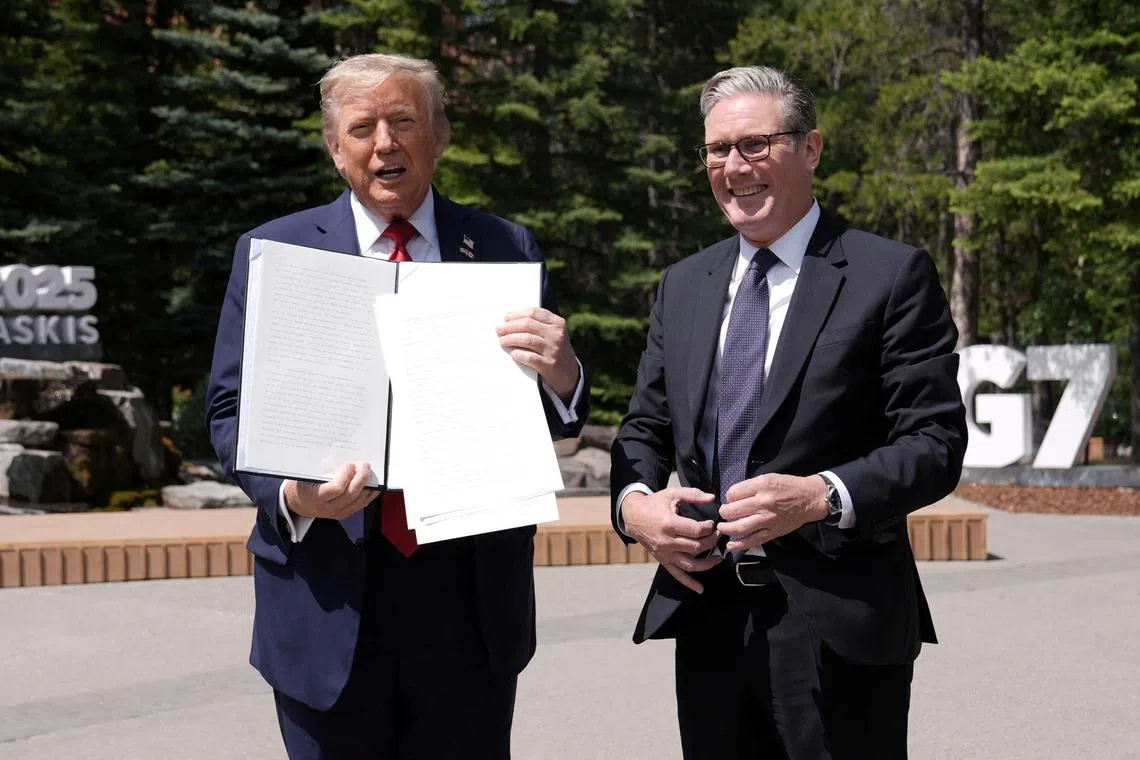US and UK announce trade deal but steel imports unresolved
Sign up now: Get ST's newsletters delivered to your inbox

US President Donald Trump holds a signed trade agreement with Britain during a meeting with British Prime Minister Keir Starmer, at the G-7 summit, in Canada.
PHOTO: REUTERS
Follow topic:
ALBERTA, Canada – US President Donald Trump signed an agreement on June 16 formally lowering some tariffs on imports from Britain as the countries continue working towards a formal trade deal.
The deal, announced by Mr Trump and British Prime Minister Keir Starmer on the sidelines of the Group of Seven Summit in Canada
Other critical industries, such as pharmaceuticals, were not mentioned.
Mr Trump said the relationship with Britain was “fantastic”, as he waved, and then briefly dropped, a document that he said he had just signed.
“We signed it, and it’s done,” he said, incorrectly calling it a trade agreement with the European Union, before making clear the deal was with Britain.
Mr Starmer called it “a very good day for both of our countries, a real sign of strength”.
The US intends to impose a quota on steel and aluminium imports from the UK that would be exempt from 25 per cent tariffs, but it is conditioned upon Britain’s demonstrating security on steel supply chains and production facilities, according to an executive order released by the White House.
The quota level will be set by Commerce Secretary Howard Lutnick, the White House said.
Britain had avoided tariffs of up to 50 per cent on steel and aluminium
The two leaders reaffirmed a plan to give British carmakers an annual quota of 100,000 cars that can be sent to the US at a 10 per cent tariff rate, less than the 25 per cent rates other countries face.
The plan will go in effect seven days after it is published in the Federal Register, the White House said.
The agreement also eliminates tariffs on the UK aerospace industry, including parts and planes, according to the executive order.
Britain was the first country to agree on a deal for lower tariffs from Mr Trump, with the US reducing tariffs on imports of UK cars, aluminium and steel, and Britain agreeing to lower tariffs on US beef and ethanol.
But implementation of the deal has been delayed while details were being hammered out, and some issues remain outstanding.
Britain called the deal a huge win for its aerospace and auto sectors, noting that the UK was the only country to have secured such a deal with Washington.
“Bringing trade deals into force can take several months, yet we are delivering on the first set of agreements in a matter of weeks. And we won’t stop there,” UK Trade Secretary Jonathan Reynolds said in a statement.
Mr Reynolds said the two sides agreed to reciprocal access to 13,000 tonnes of beef, while making clear that US imports would need to meet tough UK food safety standards.
He said both countries remain focused on securing “significantly preferential outcomes” for the UK pharmaceutical sector, and work would continue to protect industry from any further tariffs imposed as part of Section 232 investigations under way by the US Commerce Department.
When asked if the deal protects the UK from future tariff threats, Mr Trump responded: “The UK is very well protected. You know why? Because I like them. That’s their ultimate protection.” REUTERS

